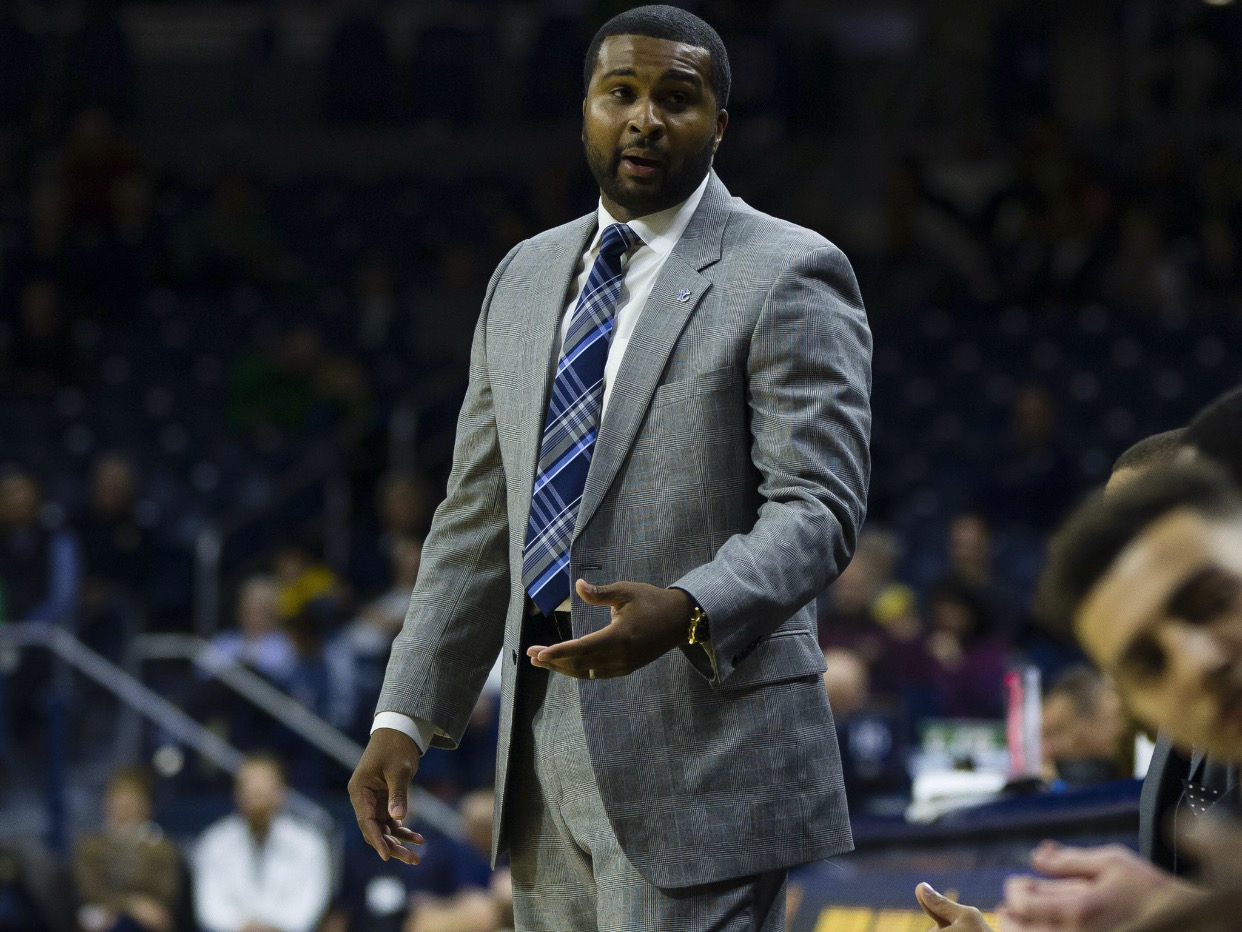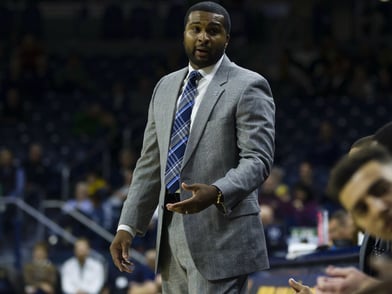The Impact of a Head Coach - Quinton Ferrell Presbyterian Men's Basketball

Oftentimes our life comes to a crossroads where we have to choose to go one way or another. For Quinton Ferrell, he arrived at that point right after college.
The 6-foot-2 point guard commanded the backcourt at Presbyterian College from 2004-2007. He made his mark on the Blue Hose as a defensive stopper and a distributor.
Ferrell was the type of kid growing up who would not watch the basketball game on the television for the highlight plays, but instead, he would notice little intricacies that helped an offense or defense perform at an optimal level. He was quickly molding himself to become a savant of the game and an extension of his coach out on the court as a floor general.
“I always had a passion for basketball outside of just playing it,” Ferrell said. “At a young age, I would sit down and watch games and I always thought that I saw a game differently and thought about it differently. I was always into really knowing why and how. Just that part of being the coach on the floor, you look at the game differently because you’re in charge of knowing where everybody is supposed to be on offense. It trains you to think like a coach when you play that position.”
Ferrell’s ability to learn extended beyond the court as well. At Presbyterian, he had a knack in the classroom, majoring in accounting.
Upon graduation, Ferrell came to that crossroad where he could have accepted a job offer and found himself poring over financial records as an accountant. Instead, he took a different route. Ferrell decided to bet on himself and joined his college coach Gregg Nibbert as a third assistant on the staff.
“As strange as it might sound to you, it really wasn’t a hard decision at all,” Ferrell said. “My faith plays a big part in how I go about making decisions. I really felt like coaching chose me. It was that clear and that easy of a decision for me.”
It’s not often that 21-year-old graduates find themselves with the opportunity to join a Division I staff. As a result, Ferrell knew he couldn’t bypass the offer that Nibbert had for him, even if it came with some uneasy stipulations.
“I know it just typically doesn’t happen that way for guys,” Ferrell said. “I just felt very strongly that it was the path for me to go down. I told him pretty much right away that I was going to do it. I just always had the mindset that I knew it would work out. I never thought of anything other than that."
“The crazy part was, a lot of people don’t know this story, but it was a volunteer spot,” Ferrell said. “I didn’t make any money my first year. I knew all of that up front, but I just knew what type of opportunity it was to be 21 and be the third assistant on a Division I staff. It just doesn’t happen that way. I believed in myself and I just thought that my college coach was a great coach, so I knew I’d be learning from somebody really, really good.”
So how did Ferrell make ends meet over the course of that season in a volunteer role? He knew he wasn’t exempt from working a typical job like anyone else and found a part-time job at a family-owned cell phone store where he worked from 8-12 every morning. The hourly wage and commission he earned from selling products and services allowed him to live, eat, and do what he loves on the basketball court as a coach.
“I knew it was no pulling out,” Ferrell said. “I was going to figure it out. That was just my approach. No ‘plan B’ type mindset. I stuck to my guns and it worked. Things started to happen going into my third year. We had an assistant leave and I got promoted. I got full-time and from not making any money it felt like a really good raise and a really good situation.”
Ferrell spent his first six years as an assistant at his alma mater before one-year pit stops at the Citadel and Army. From 2014-2019, he joined the College of Charleston as an assistant where he really made headwaves in the recruiting game and developing perimeter players. Ferrell was quietly being groomed into an up-and-coming head coach.
The North Augusta native thought that opportunity fell into his lap when Nibbert resigned in 2017, leaving the Presbyterian head coaching job open for the first time in 28 years. Ferrell went through the interview process before withdrawing his name in the final stages. A gutwrenching loss in the CAA championship with the College of Charleston still weighed on Ferrell.

“We were going to return our entire team and I had never been to the NCAA tournament as a coach,” Ferrell said. “A lot of my mentors challenged me to get to an NCAA tournament first. Over the years they would say that to me. It was always something that fueled me and drove me. I knew we had a great chance to get it done. I knew the timing was right, so I decided to go back to Charleston.”
Sure enough, the Cougars finished 26-8, won the CAA Championship, and made the big dance for the first time since 1999. The following year, College of Charleston recorded its third straight 20+ win season. Ferrell had accomplished his goals there, and in a twist of fate, Dustin Kerns left for Appalachian State, leaving the Presbyterian head coaching position open once again.
There was no doubt this time that the time was right and Ferrell was the correct fit. The one-time Blue Hose starting point guard and understudy of legendary coach Gregg Nibbert became the 19th head coach in Presbyterian history.
“I would have never thought in a million years that the job would be open two years later,” Ferrell said. “When I started at 21, I had a goal and a vision that I wanted to become a successful Division I head coach by the time I was 35. I wrote that down. That was a goal of mine. It felt really good when it happened, but it wasn’t a thing that was shocking to me in a sense because it’s what I was working towards."
“For me, starting at 21, it allowed me to gain a good bit of experience prior to becoming a head coach. I think a lot of times people really don’t understand, I got the job at 33, but I had done 12 years as a Division I coach. I worked at four different schools, so I felt like I was prepared to lead my own program.”
During the 2019-2020 campaign, the Blue Hose tallied a 10-22 overall record and 7-11 record in conference while Ferrell navigated his first year as a head coach with an extremely young roster. There was also the balancing act of all the responsibilities that now fell on Ferrell’s shoulders in what he called the biggest learning curve in his first season.
“Just physically and emotionally, the type of energy and the amount of energy it takes to run a program was an eye opener to me,” Ferrell said. “I just think the sheer volume of obligations once you become the head coach, and like I said, there’s no turning off. You’ve got to always be on and you’ve got to be at a high level.”
Ferrell finds himself in the profession for all the right reasons. Coming from a single-parent household where it was just his mother and his older sister, it was Ferrell’s basketball coaches growing up who served as the lodestar for his life.
He would pay attention to these coaches and watch how they interacted with their families. They served as a model for the man Ferrell has become all these years later.
“Just the impact they had on me, it gave me a perspective of what a coach can mean to a young person,” Ferrell said. “For me, that’s the ultimate goal is to help the next generation of guys go out in the world and be successful in their communities. Being great fathers and husbands and continuing to move society forward. That’s the reason why I coach.”
Ferrell’s impact is already evident wherever you look. It’s why former players from the College of Charleston showed up in the stands to support Ferrell in his first season as a head coach. It’s why Ferrell’s Twitter account is filled with heartfelt messages to all of his players and staff where he’s calling out the positive characteristics in them.
“It’s not a small thing when a staff member or a player commits to coming to Presbyterian. Ultimately, that means they’re choosing me,” Ferrell said. “For me, for what I’m trying to build, I think it’s very important that the people in my organization know that I care about them. That’s a really big deal to me. A lot of people preach family, a lot of people preach togetherness, and that’s all well and dandy, but I think actions speak louder than words in certain instances. Every now and then, you have to show people by actions that you really do care about them.”
It’s been a journey of opened and closed doors that have all led to the exact right spot for Ferrell. Those associated with Presbyterian can rest easy knowing its program is in good hands as Ferrell follows the same mantra that has profoundly shaped him.
“I am demanding and I hold my guys to high expectations,” Ferrell said. “That won’t change, but I want them to know too that I love them, I care for them, and I want what’s best for them.”

